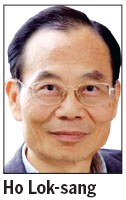Sir Murray and the long-lost culture of HK's long-term benefit
Updated: 2013-09-26 06:49
By Ho Lok-sang(HK Edition)
|
|||||||||
I was reorganizing my office when I came across a document, Report to His Excellency the Governor by the Special Committee on Land Supply. It was dated March 1982, just months before Sir Murray MacLehose left office as governor of Hong Kong. I had forgotten the document altogether, after having kept it for years.
After browsing through it I was impressed. The predecessor to this committee was established in 1977 with the name Special Committee on Land Production to identify potential areas for future urban development. The committee was reconstituted in November 1979 and took the name Special Committee on Land Supply on June 1, 1981. Under Public Rental Housing: "The policy objective is that production should be sustained at 30,000 flats a year but every effort is to be made to raise production levels as circumstances permit." The report then laid out the year of land production, the year of flat production, the land requirements, forecast land supply, the surplus/shortfall. According to the notes, "under normal circumstances, flat production can be expected within three years of sites being made available."
The report then went over the housing production targets and land requirements for the government-sponsored home-ownership schemes, the Private Sector Participation Scheme (PSPS) and the Middle-Income Housing Schemes, and then finally to private flats. For each of these schemes the report assessed where the land would come from, whether or not there would be a shortfall, and how to find the land to meet the requirements. For example, for the PSPS: "Provision for the identification of sites suitable for comprehensive engineering and building development by private developers should be included, at the appropriate time, in the planning brief for any new area in which it is decided to undertake large-scale urban development..."
Both legislators and the SAR government can learn from the report. First of all, the political system then was colonial. None of the Legislative Council (LegCo) members was elected. Yet the system was working fine. We need to ask ourselves: is democratization of the political system making things better or worse? We now hear people say the system is not working because it is not democratic enough. If this observation is correct, how can we explain the great success of the colonial government at that time?

My understanding, if I may venture to say, is that the present difficulties confronting the SAR government arise from a confrontational attitude between legislators considered politically beneficial for them. Confrontational attitudes, even unbecoming behavior, such as throwing objects at the Chief Executive (CE), will attract media coverage and will help leave their names in the minds of voters. During the colonial days, there was no point in behaving in such a way at all. Legislators, working in a democratic system, see discrediting the CE and the SAR government as a convenient way to tell voters that they are not part of the "powerful and wealthy". Otherwise, how can we make sense of the filibuster that wasted hours of everybody's time and that almost succeeded in preventing the enlarged old-age allowance from benefiting the needy?
Second, the report testifies to the vision and boldness of the now legendary Sir Murray. The Home Ownership Scheme and the PSPS were entirely new to Hong Kong, and had just become available shortly before in 1978. The land sales in 1981-82 would amaze and perhaps shock any observer today: "Sales of industrial land reached 14.3 hectares, exceeding by 21 percent the annual average target of 11.8 hectares. Sales of land for private residential (including commercial/residential) development were 52 hectares, exceeding by 30 percent the overall annual average target of 40 hectares. In 1981/82, a grand total of 79 hectares of Crown land was disposed of through the land sales program, and another 143.5 hectares through private treaty grants, which included 67.6 hectares for the Yuen Long Industrial Estate."
The land supply figures were really huge, but quite justifiable then in view of the need for industrial and commercial land for economic development, and the huge population explosion at the time, averaging 2.5 percent a year throughout the 1970s. By contrast, our population growth presently hovers between 0.5 percent and 0.7 percent per annum today. The way Sir Murray dealt with the "exigency of the times" of massive immigration was to greatly expand land and housing supply, certainly to an extent that would stretch the imagination of anyone today. There were great pressures on housing prices, but he did not do anything to suppress housing prices. He came up with the only meaningful and correct response: a physical shortage has to be addressed with expanding physical supply.
The moral of all this appears straightforward enough. It is simply that we need to identify what needs to be done and go about working together and getting it done! We just need to rebuild the long-forgotten culture of working together for the long-term benefit of Hong Kong.
The author is director of the Center for Public Policy Studies at Lingnan University.
(HK Edition 09/26/2013 page9)